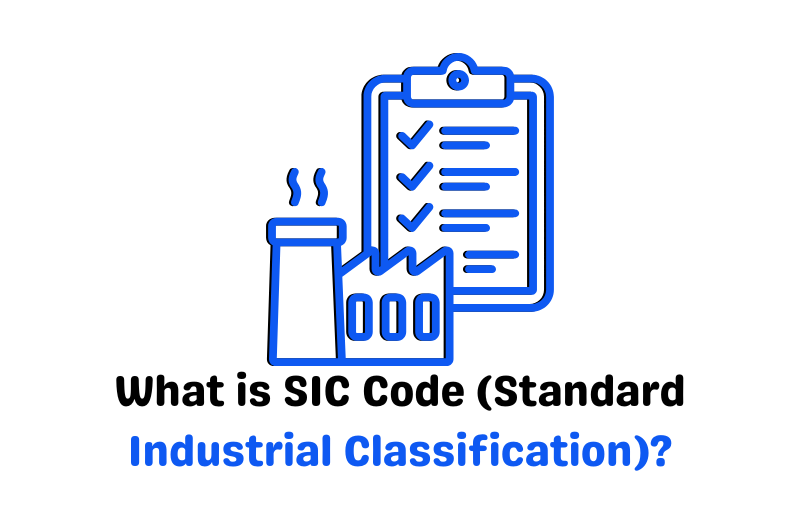What is SIC Code (Standard Industrial Classification)?
While registering your business on Companies House, select an SIC code and the question that arises first is what is SIC code? choosing an SIC code, and its requirements. This complete blog is on SIC code and relevant details.
What is SIC Code?
What is SIC code? A five-digit identification number is a Standard Industrial Classification (SIC) code that divides companies based on their main economic activity. The Office of National Statistics originally implemented Standard Industrial Classifications (SIC) in the United Kingdom in 1948 to categorise organisations according to their business. With each sector representing a large industry group, the SIC system separates businesses into sectors and sub-sectors. The first two digits show the primary industry group and the broader activity is further specified by the final three digits.
In the UK, Companies House gives a simplified list of SIC codes from which you must select at least one when registering a business. Appropriate code selection guarantees that your business is perfectly categorised, which is important for transparency and compliance.
What is my Company’s SIC Code?
The Standard Industrial Classification codes list contains the solution for selecting SIC codes for your business. It is well-arranged, with each section (A–U) representing a major industry area, like transportation or agriculture. Other subdivisions dedicated to specific operations exist within these categories. Selecting the ideal SIC code for your company can have some benefits, but it takes careful thought. It facilitates statistical analysis and ensures transparency and clarity for stakeholders. The SIC codes list, which includes well-defined divisions and subcategories, can help you effectively represent your unique business in the broader economic landscape.
How SIC Codes are Used?
After learning what SIC code is, it’s critical to comprehend its application. Since SIC codes provide an organised way to categorise and assess economic activity, businesses and governmental organisations utilise them for a variety of purposes.
For Business Use:
By employing SIC codes to identify and segment their audience by industry, businesses can more effectively market their goods and services to certain industries. Businesses can identify potential customers in a certain industry, for example, by looking at SIC codes, and then develop targeted marketing strategies. These codes help firms comply with tax laws by classifying them for tax purposes and connecting them to relevant tax legislation based on their industry.
By learning more about the financial standing of a specific industry, banks and lenders utilise SIC codes to assess the risk of financing to a company. Companies commonly utilise SIC codes for competitive analysis to identify competitors in the same industry or geographic area. Finally, SIC codes help companies get government contracts.
For Government Use:
Federal and state governments utilise SIC codes to organise and standardise economic data among their institutions. SIC codes facilitate the comparison of economic activity across multiple sectors, which is crucial for analysis and policymaking. The government also uses SIC codes for tax categorisation to guarantee that businesses are properly classified for tax purposes.
Businesses and governmental organisations can maintain a more structured, effective, and transparent approach to data analysis and economic transactions by using SIC codes. Frequent application of these codes can guarantee regulatory compliance in a variety of industries, enhance comprehensive economic planning, and promote marketing campaigns.
When do I Need the SIC Code?
At the time of registration, you must select a SIC code.
Companies House is responsible for rejecting applications for company formation. if a minimum of one SIC -code is absent. Businesses founded before June 30, 2016, were exempt from the requirement for a SIC code at the time of incorporation. A company’s annual confirmation statement contains its SIC code(s) if it has changed since the last confirmation statement or after registration. This could happen if the business grows or modifies its operations throughout the year. It may be especially prevalent during the early year, when the real trade may differ from the initial strategy.
Can I Choose More Than One SIC Code?
Many companies find that a single SIC code defines their operations. However, you can select up to four SIC codes. This is useful if your organisation’s operations are complex or varied, or if you cannot locate a code that accurately finds the nature of your business.
Conclusion:
For businesses in the UK, SIC codes are a crucial tool for legal registration, taxation, and regulatory compliance. Businesses ensure they comply with industry standards and obtain important insights into market trends and performance by selecting the appropriate SIC code. What is the most important thing to know about SIC codes? For businesses seeking finance your SIC code is a crucial first step to success, regardless of whether you are launching a new company or growing an existing one.
Disclaimer: The information provided is meant only for general informative purposes. We recommend that you consult a certified accountant for advice specific to your situation.

